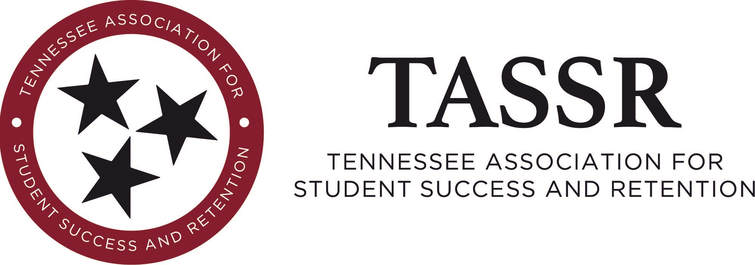TASSR Vision Statement
TASSR (Tennessee Association for Student Success and Retention) is committed to student advocacy. We will bring diverse voices together to share our expertise and to embrace innovations in education. Working collaboratively, TASSR seeks to be the leading voice of student success and retention for all stakeholders in higher education in the state and the Southeast.
TASSR Mission Statement
TASSR (Tennessee Association for Student Success and Retention) brings together college faculty, administrators, and academic support staff to achieve a common purpose: supporting students, regardless of preparation and life challenges, in pursuit of their educational goals. Through the annual statewide conference, the association journal, and regional events (TASSR on the Go), we provide members with opportunities to share their classroom practices, pedagogical theory, technological interventions, data, and success stories. We recognize and celebrate excellence through annual awards for outstanding faculty and students. Working collaboratively as a diverse and innovative group, TASSR advocates for education and the removal of barriers to achieving a college degree.
A Statement about Racial Injustice
TASSR is the Tennessee local affiliate for NOSS, National Organization for Student Success. The TASSR Executive Board fully supports and endorses the following statement published by the NOSS Equity, Access and Inclusion Network.
The mission of the NOSS Equity, Access, and Inclusion Network is to establish an open environment to nurture our members’ and stakeholders’ commitment to centering our student success work within a framework of equity, access, and inclusion. In times like these, it is difficult to find the appropriate words, but we cannot remain silent.
We mourn the unjust and preventable deaths of Mr. George Floyd, Ms. Breonna Taylor, Mr. Ahmaud Arbery, and countless others. We recognize that these senseless deaths are just three of the most recent tragedies which have occurred within our students’ communities which are also our communities. We acknowledge that these deaths and the systemic oppression which incites violence against people of color are part of the long history of institutionalized racism that plagues our nation. We condemn the continued police brutality against people of color and peaceful protesters. We stand in solidarity with students and educators who have taken to the streets to challenge social injustice. We recognize that, too often, the painful work of naming and dismantling racism falls to educators of color, whose emotional labor in this task remains unacknowledged. This work cannot be relegated to diversity-oriented groups, but must permeate the culture of higher education. Indeed, as educators, we all need to increase the visibility of our activism and our commitment to social change. We cannot be silent.
Educators have an extraordinary influence on and responsibility to our students and our communities: We have the power to change the world. In order to address and redress social injustice, we must begin with ourselves by asking:
Recognizing that each of us is at a different point, we offer the following resources as a starting point for our conversations:
In Solidarity,
The Members of the NOSS Equity, Access, and Inclusion Network
With full support and endorsement from the NOSS Executive Board
A Statement about Racial Injustice
TASSR is the Tennessee local affiliate for NOSS, National Organization for Student Success. The TASSR Executive Board fully supports and endorses the following statement published by the NOSS Equity, Access and Inclusion Network.
The mission of the NOSS Equity, Access, and Inclusion Network is to establish an open environment to nurture our members’ and stakeholders’ commitment to centering our student success work within a framework of equity, access, and inclusion. In times like these, it is difficult to find the appropriate words, but we cannot remain silent.
We mourn the unjust and preventable deaths of Mr. George Floyd, Ms. Breonna Taylor, Mr. Ahmaud Arbery, and countless others. We recognize that these senseless deaths are just three of the most recent tragedies which have occurred within our students’ communities which are also our communities. We acknowledge that these deaths and the systemic oppression which incites violence against people of color are part of the long history of institutionalized racism that plagues our nation. We condemn the continued police brutality against people of color and peaceful protesters. We stand in solidarity with students and educators who have taken to the streets to challenge social injustice. We recognize that, too often, the painful work of naming and dismantling racism falls to educators of color, whose emotional labor in this task remains unacknowledged. This work cannot be relegated to diversity-oriented groups, but must permeate the culture of higher education. Indeed, as educators, we all need to increase the visibility of our activism and our commitment to social change. We cannot be silent.
Educators have an extraordinary influence on and responsibility to our students and our communities: We have the power to change the world. In order to address and redress social injustice, we must begin with ourselves by asking:
- What can we do to unearth and address our own implicit biases and prejudices?
- What can we do to decolonize our pedagogy, curriculum, and interactions with students?
- What can we do to support students—particularly students of color?
- What can we do to eradicate structural injustice within our institutions?
- What can we do to support positive change in our society and government?
Recognizing that each of us is at a different point, we offer the following resources as a starting point for our conversations:
- National Museum of African American History and Culture "Talking About Race" Portal
- Center for Organizational Responsibility and Advancement (CORA) YouTube page
- Dr. Jennifer Eberhardt--How Bias Works
- Scaffolded Anti-Racist Resources
- JSTOR Daily--Institutional Racism: A Syllabus
In Solidarity,
The Members of the NOSS Equity, Access, and Inclusion Network
With full support and endorsement from the NOSS Executive Board
TASSR and TNADE History
This document compiled by archivist Barbara Kannard lists the location and theme of each conference of TASSR since its beginning in 2011, along with the names of its presidents and presidents-elect.
